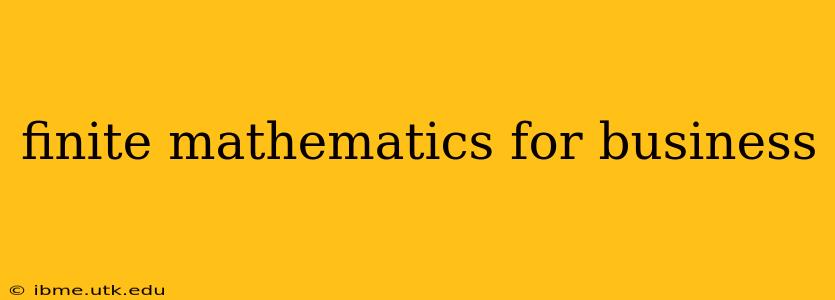Finite mathematics plays a crucial role in making informed business decisions. It provides the quantitative tools necessary to analyze complex situations, predict outcomes, and optimize strategies across various business functions. This guide explores the core concepts and applications of finite mathematics in the business world, addressing common questions and providing valuable insights for students and professionals alike.
What is Finite Mathematics and Why is it Important for Business?
Finite mathematics focuses on mathematical concepts applicable to situations involving a finite number of elements. Unlike calculus, which deals with continuous functions, finite math uses discrete structures like sets, graphs, and matrices. This makes it ideally suited for analyzing business problems where variables are often countable and distinct – think inventory levels, production schedules, or network connections. Its importance stems from its ability to:
- Optimize resource allocation: Finite math techniques like linear programming help businesses maximize profits or minimize costs by efficiently allocating resources such as materials, labor, and capital.
- Improve decision-making: Statistical methods within finite mathematics allow businesses to analyze data, identify trends, and make more informed decisions under conditions of uncertainty.
- Model complex systems: Network analysis, a key component of finite math, helps visualize and understand relationships between different parts of a business, supply chains, or even competitive landscapes.
- Solve logistical problems: Concepts such as graph theory enable businesses to optimize transportation routes, scheduling, and network design.
What are the Main Topics Covered in Finite Mathematics for Business?
A typical finite mathematics course for business students covers a range of topics including:
- Set Theory: Understanding sets, subsets, operations on sets, and Venn diagrams is fundamental to many other concepts.
- Logic and Propositional Calculus: This section teaches how to analyze arguments and statements, crucial for evaluating business propositions and contracts.
- Counting and Probability: Learning about permutations, combinations, and probability distributions is essential for risk assessment and decision-making under uncertainty.
- Linear Programming: A cornerstone of optimization, linear programming allows businesses to find the best possible solution given constraints on resources.
- Matrices and Markov Chains: Matrices provide a powerful tool for organizing and manipulating data, while Markov chains model systems that change states probabilistically over time (e.g., customer loyalty).
- Game Theory: Understanding game theory helps businesses analyze competitive interactions and strategize effectively in situations with multiple players.
- Graph Theory: Analyzing networks and relationships through graphs helps optimize transportation, communication, and other network-related business operations.
What are some real-world business applications of Finite Mathematics?
Finite mathematics isn't just theoretical; it's a practical tool with widespread applications in various business areas:
- Finance: Portfolio optimization, risk management, financial modeling.
- Marketing: Market research analysis, campaign optimization, customer segmentation.
- Operations Management: Inventory control, production scheduling, supply chain optimization.
- Human Resources: Employee scheduling, workforce planning, personnel allocation.
How is Finite Mathematics Different from Calculus?
While both are branches of mathematics, they address different types of problems. Calculus deals with continuous change and rates of change, whereas finite mathematics focuses on discrete quantities and structures. Calculus is often used in areas like continuous growth modeling (e.g., compound interest), while finite mathematics is more applicable to situations involving distinct, countable entities.
What are the prerequisites for a Finite Mathematics course for Business?
Generally, a basic understanding of algebra and some exposure to statistical concepts is helpful but not always strictly required. The course is designed to be accessible to students with a diverse range of mathematical backgrounds.
Where can I learn more about Finite Mathematics for Business?
Many universities offer dedicated finite mathematics courses for business students. Online resources, textbooks, and tutorials are also widely available, providing alternative learning pathways.
This guide provides a broad overview of finite mathematics for business. By mastering these techniques, businesses can gain a competitive edge through improved decision-making, optimized resource allocation, and a deeper understanding of complex systems.
